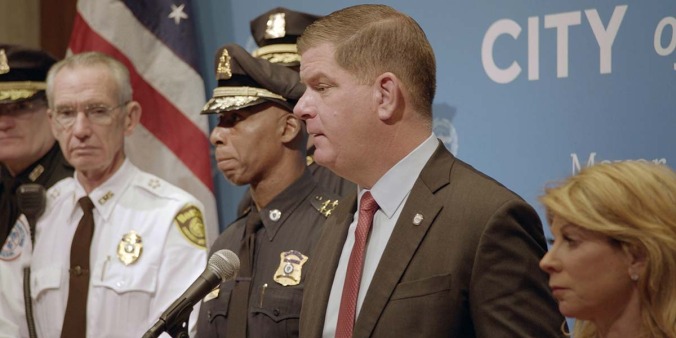Frederick Wiseman’s mammoth-length City Hall finds humanity alongside the bureaucracy

In many respects, City Hall looks like a documentary that Frederick Wiseman might have made four or five decades ago, when he was first exploring how America’s most basic institutions function (or don’t). You wouldn’t be surprised to find it alongside such titles as High School (1968), Hospital (1970), Juvenile Court (1973), and Welfare (1975); given Wiseman’s enduring preoccupation with the nexus of ordinary people and well-meaning authority, it’s rather surprising that he took so long to start tackling government head-on. (A similar film, State Legislature, premiered in 2007.) Still, the world has changed over the past 50 years, and so, too—of late, in particular—has Wiseman’s focus. His occasional geographical portraits now make a point of depicting cultural diversity (In Jackson Heights) or the absence thereof (Monrovia, Indiana). And for City Hall, he’s chosen to look at the municipal workings of Boston, which still has a strong Irish-Catholic image for many people but is in fact “majority minority,” with a population that’s more than 50% people of color. How that gets navigated on a day-to-day basis is the film’s primary, never-stated subject.
It also has a primary human subject in Boston’s current mayor, Marty Walsh. Elected in 2014, after a long stint in Massachusetts’ House of Representatives, Walsh is an Irish-Catholic Democrat who’s very much aware of his city’s (and the country’s) shifting demographic, and seemingly determined to make sure that every facet of local government reflects that shift. Like most Wiseman films, City Hall lacks any clear narrative progression, simply moving from one discrete interaction to the next; montages of exteriors—the vast majority of the movie takes place indoors—serve as chapter dividers of a sort. But almost everywhere that the camera goes, from a veterans’ hall to a food bank to a senior center to Fenway Park (Wiseman shot during late 2018 and early 2019, starting shortly after the Red Sox won the World Series), Walsh turns up, speaking to his constituents and ensuring them that he’s mindful of their needs. If anything, he’s almost too relentlessly empathetic and sincere to be terribly interesting, though the film provides a sense of just how much time the mayor of a major city spends addressing public functions.
And there’s a whole lot of that in City Hall, which runs a whopping (but never punishing) four-and-a-half hours. Another fairly recent development in Wiseman’s work is his fascination with meetings and speeches; there’s roughly three hours here of people—often, but not always, Walsh—either talking into a microphone or sitting around a conference table. Some of these meetings, quite frankly, are the kind that the people who are actually attending them clearly wish that they could have skipped. In the opening 10 minutes, Wiseman serves up a budget-allocation seminar, complete with pie charts on an overhead projector and a guy who comes across like the world’s dullest grad-student teaching assistant, as if daring weak-willed viewers to flee. Another scene asks us to listen patiently as someone describes the Department of Housing and Urban Development’s noxious proposed change to the Fair Housing Act’s disparate impact standard (which finally went into effect just last month)—the sort of basic factual information that’s better absorbed via print. A lot of City Hall feels like C-SPAN: You’re witnessing important work, but is that really what you want to be doing?
Thankfully, there are exceptions. Well into the movie’s third hour, a legally mandated public discussion concerning a proposed cannabis dispensary in Dorchester—one of Boston’s poorest and most diverse neighborhoods—explodes into a series of polite yet heated confrontations, as the men seeking to build the store (who are mostly Asian American) field questions regarding whether they really give a damn about the people who’d be their patrons. (For a potentially lethal drinking game, down a shot every time someone says the word “community.”) It’s giving ordinary citizens the floor that makes the difference, and City Hall truly comes alive when Wiseman’s out on the street, observing a building inspector of some sort sign off on a condo under construction, or demonstrating how Boston’s traffic engineers monitor possible jams on a huge bank of closed-circuit monitors, or even just witnessing the goofy spectacle of a garbage truck devouring discarded mattresses, bed frames, and (somehow) an entire metal barbecue grill. Immediately after the aforementioned budget meeting from hell, Wiseman cuts to a civil marriage ceremony, in which the officiant takes two self-conscious young women through the ritual and then, momentarily on archaic autopilot, concludes, “I now pronounce you hu—uh, married.” That’s the movie both in a nutshell and at its most richly, only semi-bureaucratically human.